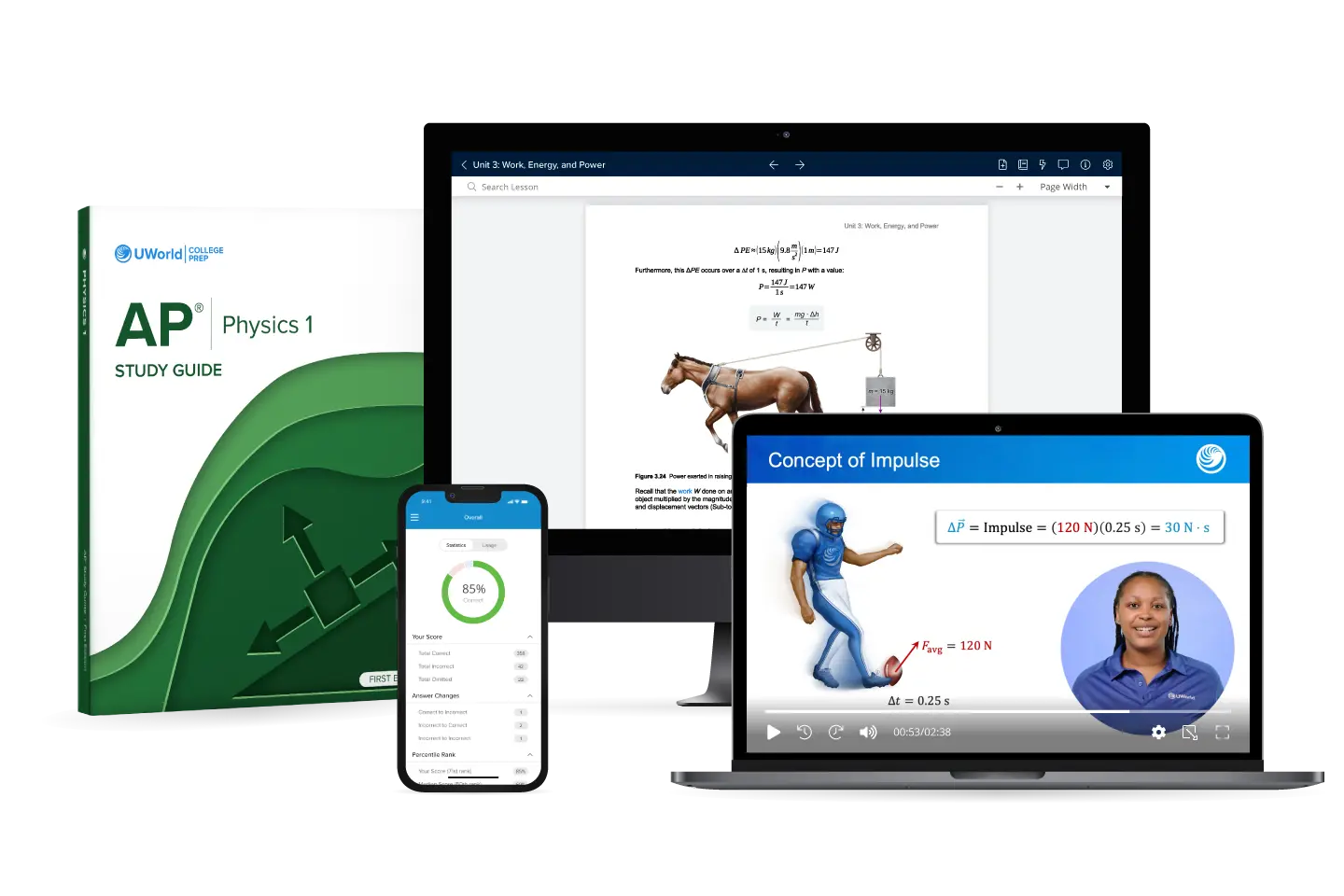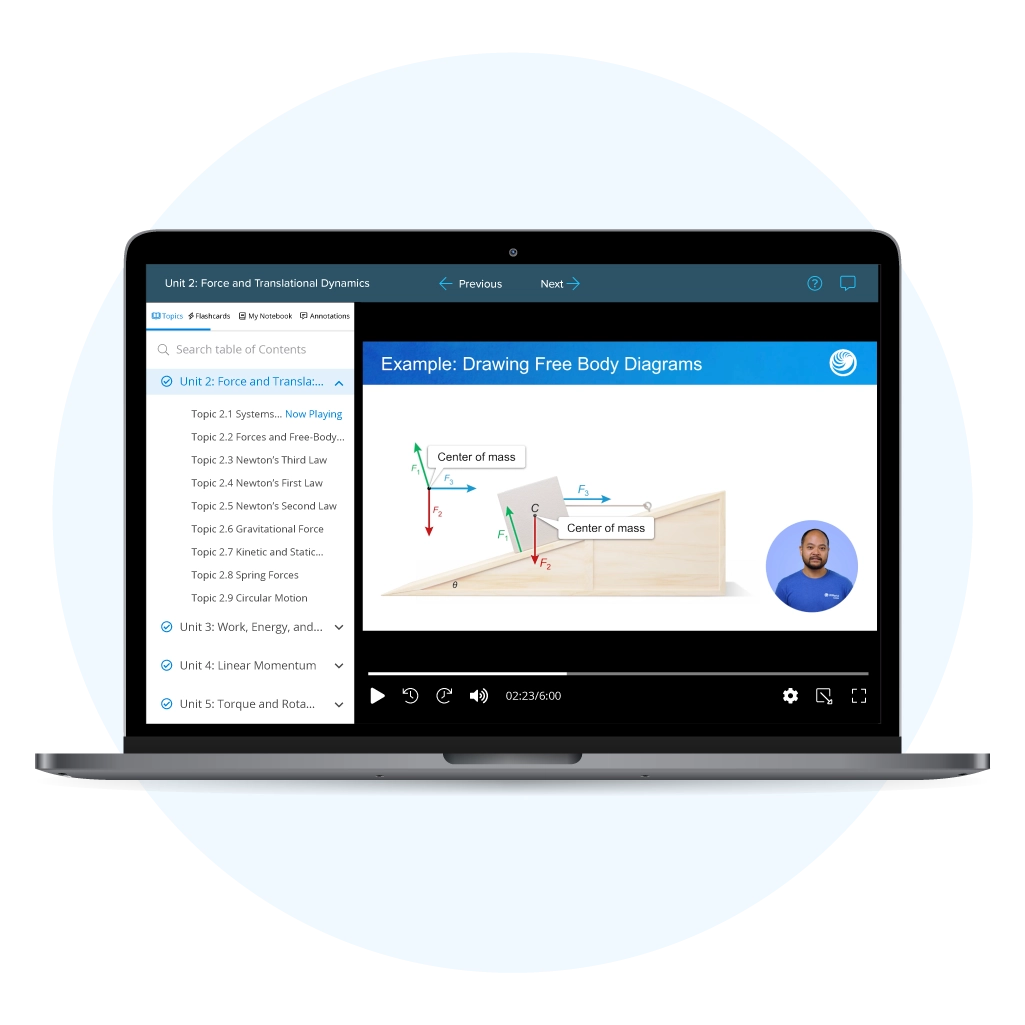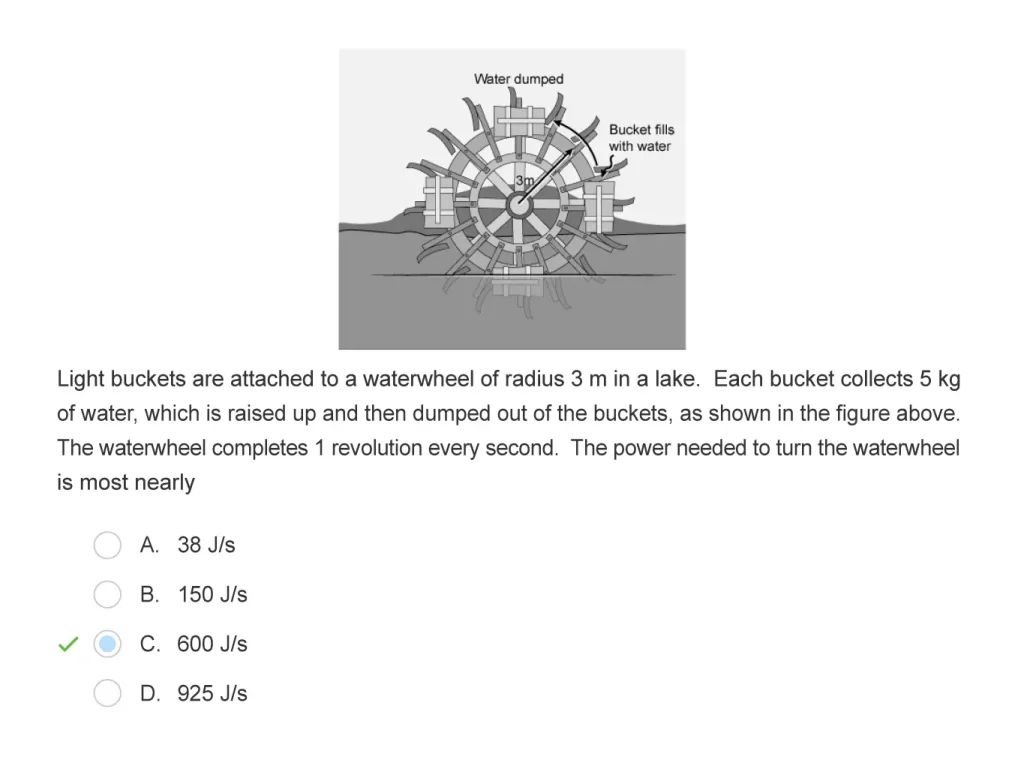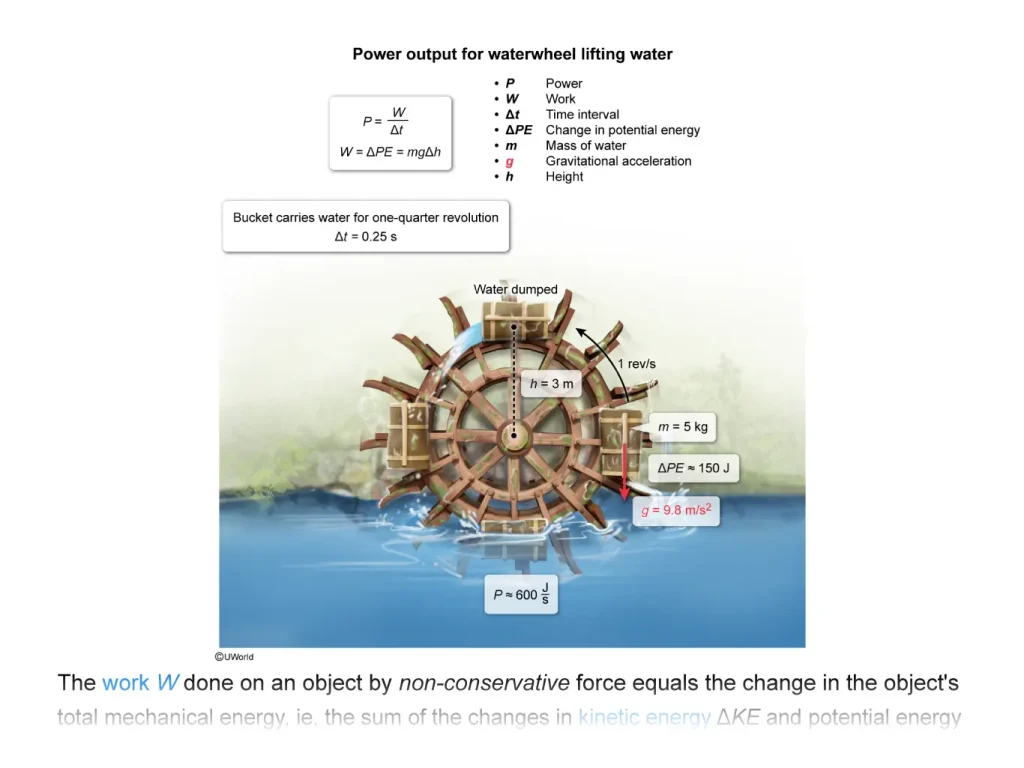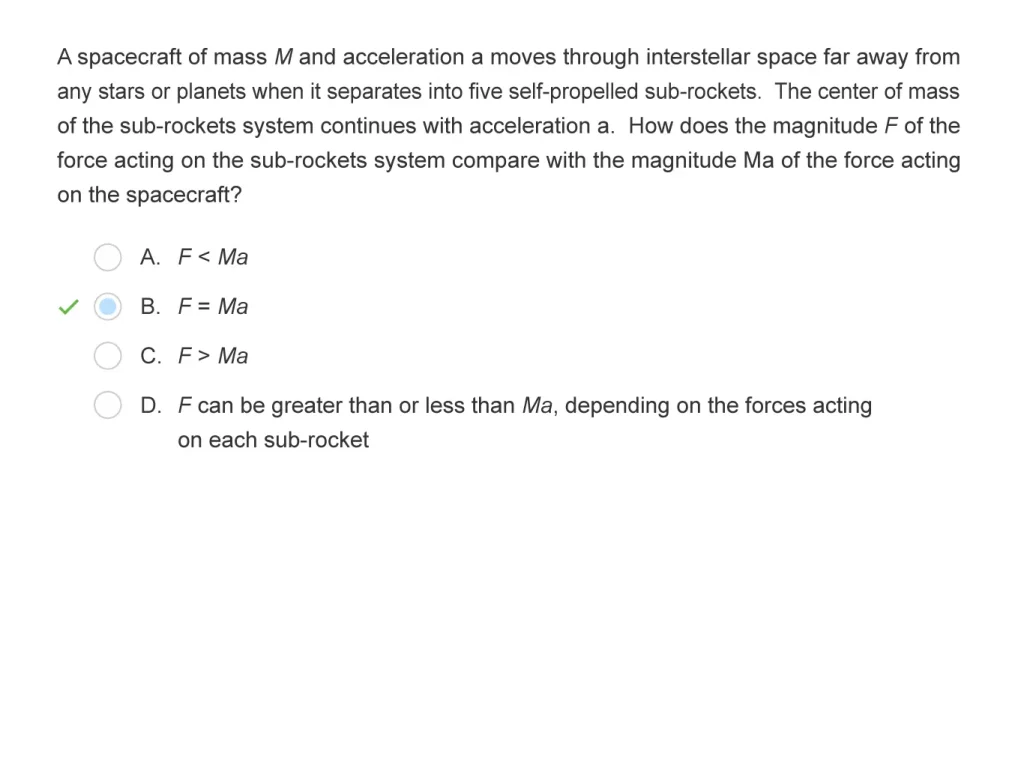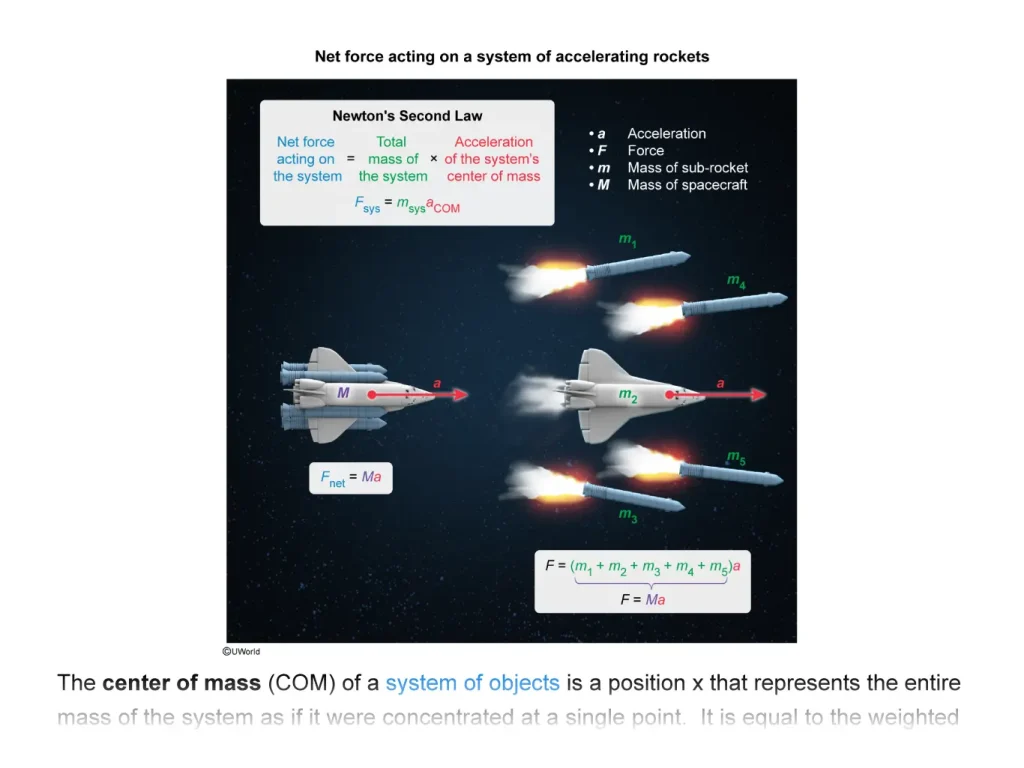AP® Physics 1 Review & Online Course
Boost Your Confidence and Score with Our All-in-One AP Physics 1 Review Course
Master the essentials with our AP Physics 1 study guide and educational videos. Practice with hundreds of Physics 1 review questions, complete with answer explanations that have visual aids to simplify tough topics. Quickly see where you need to focus with a progress dashboard and develop the skills to score 5 on the AP Physics 1 exam!
Engaging AP Physics 1 Review Video Lessons
Our quick, engaging lessons make challenging science topics simple and interesting. Whether you prefer reading or watching, we cover every key AP Physics 1 concept so you feel confident in class and during your AP Physics 1 test review.
Interactive AP Physics 1 Study Guides
Our AP Physics 1 print and digital review guides let you quickly review each unit, topic, and subtopic on the exam—without the hassle of bulky textbooks. Built-in knowledge checks help you track progress, identify gaps, and make your Physics 1 exam review efficient and stress-free.
450+ AP Physics 1 Practice Questions & Exam Review
Conquer AP Physics 1 multiple-choice questions (MCQs) with exam-style practice problems designed to cover the topics and difficulty level you'll face on the actual AP exam. Illustrated explanations help you easily understand advanced scientific principles.

Study Anywhere, Anytime
Tackle AP Physics 1 practice questions on the ride home from a game, review topic videos between classes, or dive into a study guide while waiting for friends at the coffee shop. Keep everything you need to ace the AP Physics 1 exam right at your fingertips. Get the app today!
Stand Out
with a Top Score in AP Physics 1
Boost your performance and make yourself a standout candidate for competitive colleges, majors, and scholarships by mastering your AP Physics 1 course and scoring a 5 on the exam.
Get our all-in-one course today!
- Focused AP Physics 1 Review Videos
- Print & Online AP Physics 1 Study Guide
- 450+ Physics 1 Exam-style Practice Questions
- Score-Predicting Full-Length Exam
- Customizable Quiz Generator
- Adjustable Study Planner
- Realistic AP Physics 1 Exam Review
- Timed Test Simulation
- Progress Dashboard
- Smart Flashcards
- Digital Notebook
Hear From Our AP Physics 1 Students

UWorld’s service is pretty good and helps provide a lot of explanations on subjects I haven’t been confident on before.

The questions here are the most realistic to the AP tests I've seen so far! I appreciate the ability to customize tests as well.

The best part is that all options are well-explained, telling clearly why they are not the right option.
AP Physics 1 Course by UWorld: Frequently Asked Questions (FAQs)
What topics are covered in the AP Physics 1 course?
All included units and topics in the course align to the current College Board® CED for AP Physics 1. The video lessons, study guide and exam questions in our AP Physics 1 full review course cover the entire 8-unit curriculum including:
- Unit 1: Kinematics – Describe how objects move using position, velocity, and acceleration.
- Unit 2: Dynamics: Forces and Motion – Analyze how forces cause changes in motion using Newton’s laws.
- Unit 3: Circular Motion and Gravitation – Explore motion in circles and the forces behind planetary and orbital motion.
- Unit 4: Energy – Examine work, energy transformations, and conservation of energy.
- Unit 5: Momentum – Understand impulse, momentum, and collisions in isolated systems.
- Unit 6: Simple Harmonic Motion – Study periodic motion in springs, pendulums, and oscillating systems.
- Unit 7: Torque and Rotational Motion – Apply Newton’s laws to rotational systems and analyze torque and angular momentum.
- Unit 8: Fluids – Investigate fluid properties, pressure, buoyancy, and flow dynamics.
Each concept in the AP Physics 1 prep book helps you connect principles across topics, strengthen scientific reasoning, and prepare confidently for both multiple-choice and free-response questions.
Why use UWorld AP Physics 1 course vs a free course like Khan Academy?
There are free course options from Khan Academy but the World AP Physics 1 course offers a distinct advantage. It is built specifically to align with the AP exam format and curriculum. While resources like Khan Academy cover foundational knowledge, our 450 exam-style practice questions feature in-depth explanations for every answer choice, teaching you the underlying concepts and reasoning. Furthermore, our platform includes integrated tools like a realistic timed test simulation and a progress dashboard, videos and book.
UWorld’ AP Physics 1 course provides the structured, exam-focused experience you need to excel on the AP exam that free resources do not offer.
When should students start using an AP Physics 1 online course?
The UWorld AP Physics 1 Course is designed to fit your schedule and learning goals. Whether you want to get ahead, stay on track, or review before exams, you can start anytime.
- Students can start using the UWorld AP Physics 1 Course at any point in their learning journey. It’s flexible enough to support summer prep, midterm or final exam review, or serve as a complete course for students without access to an AP Physics 1 class at school.
- Because the AP Physics 1 Course includes video lessons, a comprehensive study guide, and hundreds of practice questions, students can follow a simple watch–read–practice method to master each topic. Many learners complete the full course over the summer to get ahead, while others use it gradually throughout the school year for ongoing support and exam preparation.
- It also works perfectly as an AP Physics 1 crash course. You can focus on specific areas of weakness by reviewing related videos, study materials, and practice questions to strengthen those units before exams.
No matter when you start, the watch–read–practice approach makes it easy to learn at your own pace and build confidence for the AP exam.
Can I use the AP Physics 1 course throughout the semester to prepare for my midterms and finals?
Absolutely, the course can be used as an AP Physics 1 midterm review. It is an excellent resource for all your in-class exams. The content is fully aligned with the College Board’s curriculum, which is what your teacher uses to create midterms and finals. You can use the customizable quiz generator to build tests focusing only on the specific units covered in your exam. The adjustable study planner also helps you organize your study schedule leading up to these important tests, not just the final AP exam.
I’m self-studying for the AP Physics 1 exam. How is the course structured to help independent learners?
UWorld is an exceptionally valuable resource for self-studiers, as it is designed to fill the gaps left by the absence of a formal teacher and classroom environment. Here’s how our AP Physics 1 Question Bank specifically empowers you on your self-study journey:
- Detailed Explanations Act as Your Virtual Tutor: Understand the “why” behind every answer. Our step-by-step rationales for all options break down complex concepts and include helpful visuals, teaching you the material as you practice.
- Pinpoint Your Weaknesses: Our performance analytics show you exactly which topics you are struggling with. This allows you to focus your study time efficiently on the areas where you need the most improvement, ensuring you study smarter.
- Realistic, Exam-Level Practice: Prepare with hundreds of multiple-choice and free-response questions (FRQs) that mirror the difficulty, style, and scope of the actual AP exam. You’ll build confidence and familiarity, so there are no surprises on test day.
- Customizable and Flexible Learning: Take control of your study plan by creating practice tests tailored to your needs. Focus on specific units like Energy or Momentum, or mix topics to simulate different exam sections.
In short, while UWorld cannot replace a full curriculum, it serves as the ideal practice and remediation tool for self-study.
Is an AP Physics 1 course worth the investment?
Absolutely. A strong performance on the AP Physics 1 Exam can translate into college credit, saving students thousands of dollars in tuition and even helping them graduate early. Beyond the financial benefits, earning a qualifying score (3 or higher) demonstrates college-level readiness while top scores (4–5) can strengthen college applications and stand out to competitive programs.
An AP Physics 1 review course like UWorld’s gives students the structure, practice, and confidence needed to perform at their best. It builds the critical thinking and study habits essential not only for the AP exam but also for future college success.
What features and study materials come with UWorld’s AP Physics 1 course?
Our AP Physics 1 review course is a comprehensive, all-in-one resource featuring integrated study tools designed to help you efficiently learn, deeply retain, and confidently master every key concept required for the exam.
The complete course includes the following high-impact features:
- Expert-led Video Lessons: Simplify difficult topics with our focused, expert-led video lessons. These lessons feature easy-to-understand, step-by-step teaching animations that break down complex physics concepts, ensuring you grasp the material quickly.
- Print & Digital Study Guide: Receive a streamlined prep book available in both a physical print edition and an interactive online format. This guide uses colorful visuals and high-impact illustrations to simplify tough topics and includes Check-for-Understanding questions to ensure concept mastery before you tackle advanced practice.
- 450+ AP-Level Practice Questions (QBank): Hone your problem-solving skills with a robust Question Bank containing over 450 exam-style practice questions that accurately match the difficulty and format of the actual AP exam.
- Score-Predicting Full-Length AP Physics 1 Exam: Take a full-length practice test under real exam conditions and receive an estimated AP score.
- Customizable Quiz Generator: Strategically boost your score by creating custom practice tests focused specifically on the units, topics, and subtopics where you need the most review.
- Smart Study Planner: Tailor your preparation to fit your life. Our adjustable study planner lets you choose your available days and study time, providing a personalized plan that keeps you consistently on track toward your exam goal.
- Realistic Timed Test Simulation: Prepare for exam day with practice tests that mimic the timing and conditions of the official AP Physics 1 test, allowing you to build endurance and refine your test-taking strategy.
- Progress Tracking Dashboard: Watch your scores improve in real-time. The Progress Dashboard provides powerful performance tracking to help you quickly identify your strengths and pinpoint the remaining areas requiring review.
- Digital Smart Flashcards: Enhance learning and long-term retention with our intelligent, tech-enhanced flashcards and a customizable digital notebook.
Our goal is to provide everything you need to master the material and feel confident on exam day. You can explore all of these features today with our Free 7 Day Trial.
Is the AP Physics 1 review course helpful for students at all levels?
Yes! The UWorld AP Physics 1 Review Course is designed to support every type of learner, whether you’re building confidence, strengthening skills, or striving for a perfect score.
- For struggling students: UWorld offers clear, step-by-step video explanations and Smart Flashcards that simplify difficult concepts and reinforce core ideas, helping you build a solid foundation in physics.
- For average AP students: The watch–read–practice approach, combined with targeted quizzes and detailed answer explanations, helps deepen understanding, close knowledge gaps, and improve test performance over time.
- For advanced learners: A vast library of challenging, exam-style practice questions, realistic custom exam simulations, and performance analytics provides the rigor and precision needed to fine-tune skills and aim for a top score.
No matter your starting point, our AP Physics 1 course meets you where you are, offering personalized, high-quality preparation that builds confidence, mastery, and measurable progress for every student.
Can UWorld’s AP Physics 1 course help me understand complex concepts like kinematics and linear momentum?
Master challenging AP Physics 1 topics, from kinematics to fundamental principles like Newton’s Laws of Motion using our AP Physics 1 review course. UWorld’s detailed visual explanations and focused videos break down complex consents with clear step-by-step rationales. If you need extra practice on a specific concept, build personalized quizzes using our exam-style questions to turn your weaknesses into strengths.
How is UWorld better than a free AP Physics 1 review course PDF?
While a static PDF is just a fixed list of questions, the UWorld platform is a dynamic and interactive learning tool designed to maximize your study efficiency.
Here are the key features a review PDF cannot offer:
- Customizable Quizzes: Go beyond a fixed set of problems. You can create unlimited, targeted practice tests based on specific topics (e.g., only questions on conservation of energy), question difficulty, or timed modes that simulate exam conditions.
- Realistic Exam Simulation: Practice in an environment that mimics the interface and timing of the actual digital AP exam. This builds familiarity and reduces test-day anxiety in a way that reading from a PDF cannot.
- Performance Tracking & Analytics: Our platform analyzes your performance in real-time to pinpoint your specific weaknesses. It breaks down your progress by topic, helping you focus your study time on the areas that need the most improvement.
- Continuous Content Updates: Our question bank is constantly reviewed and updated by physics experts to align with the latest College Board curriculum. You can be confident you are studying the most relevant material, unlike a potentially outdated PDF.
UWorld transforms passive practice into an active, data-driven study session that adapts to your personal learning needs.
